By 2050, AI espionage could lead you into a complex world. On one hand, advanced surveillance technologies might enhance security, but ethical dilemmas around privacy and discrimination could pose significant challenges. The economic impacts could weaken innovation, while legal frameworks struggle to keep up. You may find that society's trust in institutions could erode. Exploring both the opportunities and pitfalls of AI espionage will reveal where we might end up in this evolving landscape.
Key Takeaways
- By 2050, AI-driven surveillance may enhance security but risks infringing on personal privacy and civil liberties, creating a dystopian atmosphere.
- The potential for biased AI decision-making could lead to discrimination against marginalized communities, exacerbating societal inequalities and tensions.
- Advances in AI could facilitate corporate espionage, resulting in significant economic consequences and legal challenges as regulations struggle to keep pace.
- The misuse of AI for misinformation and deepfakes might erode public trust in institutions, fostering a climate of skepticism and paranoia.
- Proactive advocacy and ethical guidelines are crucial to navigate the balance between security needs and individual rights, shaping a more equitable future.
The Evolution of AI Surveillance Technologies
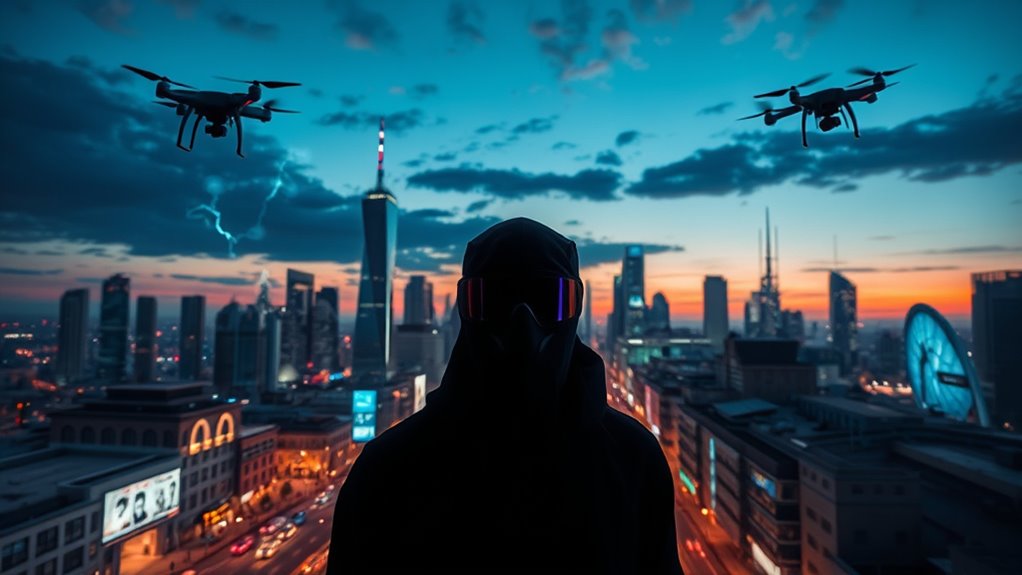
As technology advances, AI surveillance has evolved into a powerful tool for enhancing security measures.
You'll find that AI-powered video analytics can analyze feeds in real-time, alerting you to unauthorized access or suspicious behavior. With anomaly detection, these systems minimize false alarms and boost response efficiency.
Object tracking allows constant monitoring, reducing reliance on human intervention. Behavioral analysis helps identify unusual activities by learning typical patterns. Furthermore, AI-driven surveillance systems can differentiate between normal and abnormal events, significantly improving overall security effectiveness.
Object tracking enables continuous surveillance, while behavioral analysis discerns anomalies by understanding established patterns.
Additionally, facial recognition technology strengthens access control, matching faces against watchlists and providing immediate alerts. Predictive analytics proactively detect threats by analyzing patterns, helping you allocate resources more effectively.
Autonomous drones patrol perimeters, delivering real-time video feeds for better situational awareness, while integration with existing systems creates a comprehensive security ecosystem.
Ethical Dilemmas in AI-Driven Espionage
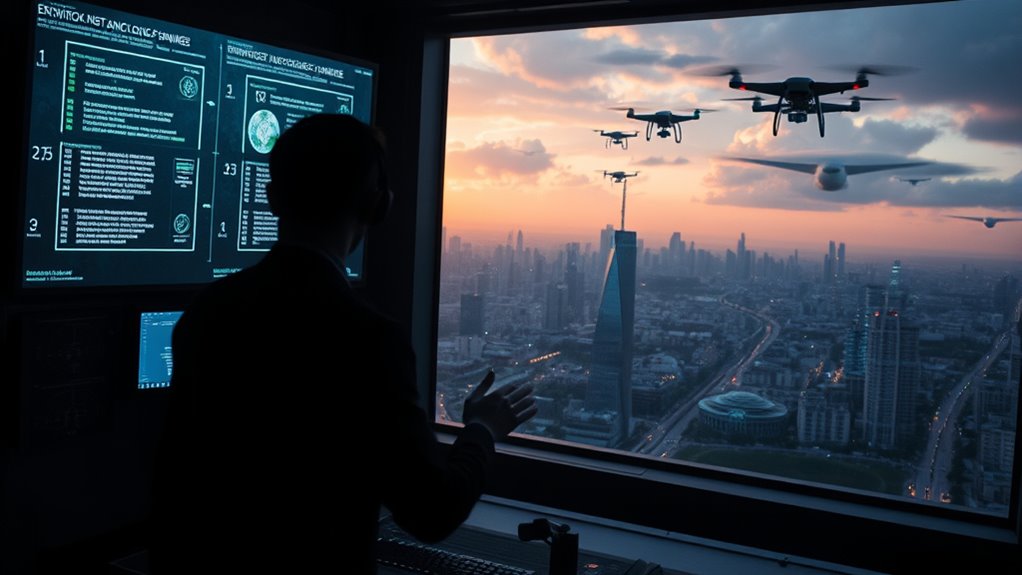
What happens when the line between security and privacy blurs in the realm of AI-driven espionage? You face a landscape riddled with ethical dilemmas.
The vast data collection necessary for AI surveillance raises serious privacy concerns, often crossing into unauthorized territory. Additionally, AI systems can perpetuate biases, leading to discrimination in espionage practices. As 81% of U.S. workers have expressed concern about AI's impact on privacy, the stakes are high for safeguarding personal information. The reliance on automated insights in decision-making can further exacerbate these ethical issues.
With the lack of transparency in AI decision-making, accountability becomes murky, complicating who's responsible for potential abuses. Cyber vulnerabilities also pose risks, as attackers could manipulate AI systems for malicious purposes.
You must consider the implications of AI-driven misinformation, which can distort public perception and trust. Navigating these ethical challenges is crucial to ensuring responsible use of AI in espionage while maintaining societal values.
Economic Impacts of AI on Espionage Practices
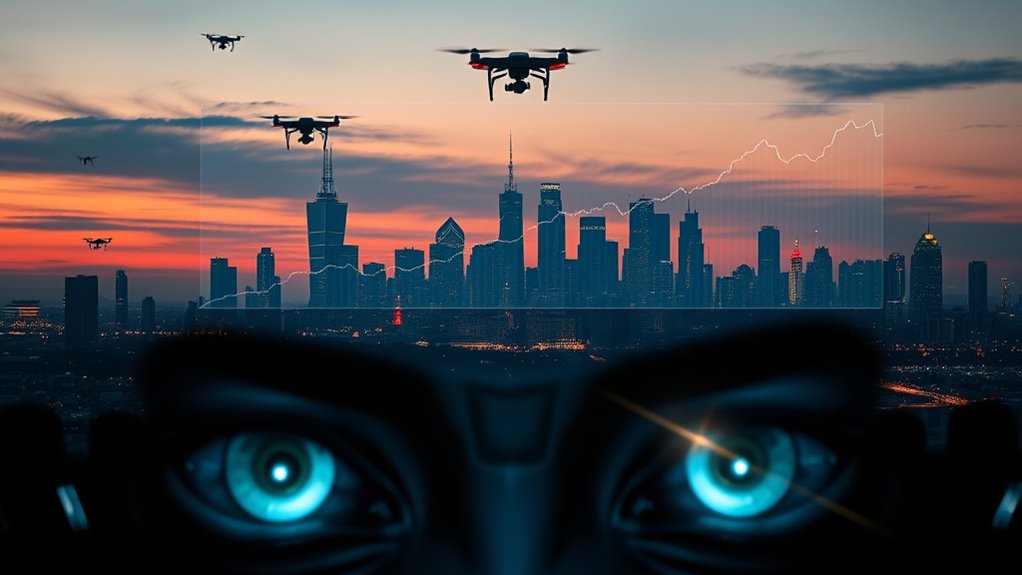
The ethical dilemmas surrounding AI-driven espionage extend into significant economic impacts that reshape how nations and corporations operate. AI enhances data collection, making espionage more efficient, but it also increases vulnerabilities that can lead to costly data breaches. Cyber espionage targets include government agencies, defense contractors, and major corporations, further complicating the economic landscape. Intellectual property theft becomes easier, boosting the value of stolen information. This AI-driven espionage can disrupt economic activities, particularly targeting critical infrastructure, which poses national security threats. Companies face financial losses and competitive disadvantages due to theft, while the fear of espionage stifles innovation. As businesses invest heavily in advanced cybersecurity, resources are diverted from productive activities, ultimately slowing economic growth. The landscape of global trade shifts, with regulatory challenges emerging as laws struggle to keep pace with this evolving technology.
Societal Ramifications of AI Espionage

While AI espionage promises enhanced efficiency in data collection, it also raises significant societal privacy concerns that can impact lives globally. Increased surveillance may infringe on your privacy rights, making you feel constantly monitored. Moreover, AI can amplify existing biases in data, leading to discriminatory practices that target marginalized communities unfairly. The ability of AI to analyze vast amounts of data can expose your private information without your consent. Additionally, advanced tools can create deepfakes, manipulating public opinion or discrediting individuals. As a result, ethical dilemmas surrounding data privacy and security become more pressing, eroding trust in institutions. AI tools designed for intelligence gathering may further exacerbate these issues by expanding surveillance capabilities, often without adequate oversight. You must consider these ramifications as society navigates the complexities of AI espionage and its effects on personal freedoms.
Legal Challenges in the Age of AI Espionage

As AI espionage continues to evolve, navigating the legal landscape becomes increasingly complex for those involved. Engaging in AI-driven corporate espionage can lead to serious criminal charges like theft of trade secrets and wire fraud, resulting in hefty fines or imprisonment. The technical intricacies of AI systems complicate defenses, often requiring expert testimony to clarify unlawful uses. Furthermore, the rise of AI technology enables faster and more efficient methods of gathering confidential information, intensifying the challenge for legal practitioners. Additionally, the lack of transparency in government surveillance raises ethical concerns and fuels criticism, particularly regarding civil rights implications. You must also be aware of the potential for digital rights violations, as illegal searches can lead to evidence dismissal. Understanding these legal challenges is crucial for anyone operating in the realm of AI espionage.
Future Trends in Autonomous Espionage Systems
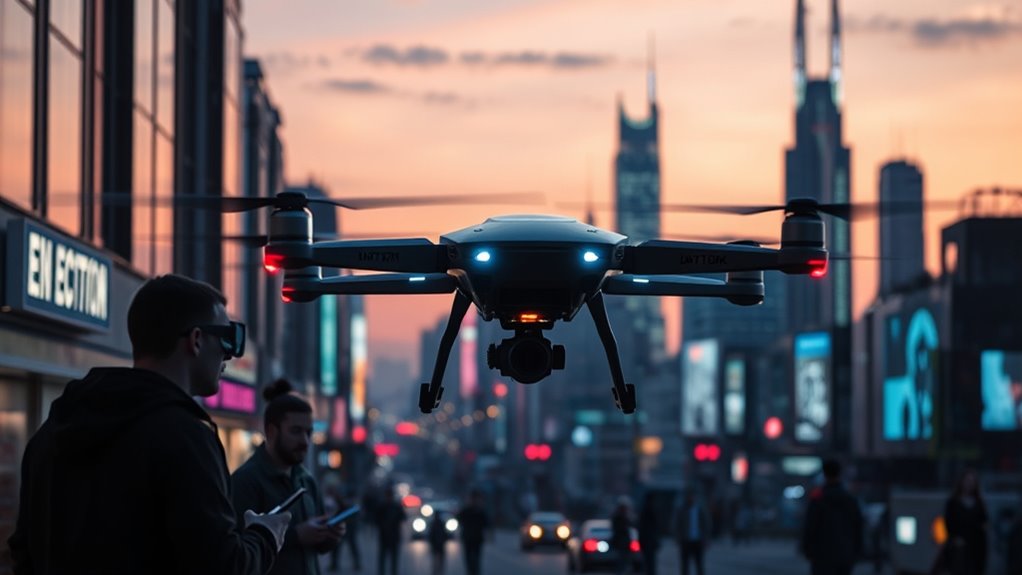
With advancements in technology reshaping the landscape of espionage, autonomous systems are set to revolutionize how intelligence is gathered and processed.
These AI-driven tools can analyze vast datasets rapidly, enhancing threat identification and operational efficiency. By autonomously collecting and analyzing information, they increase the speed and scope of intelligence operations, leveraging open-source data for broader insights.
However, this shift also sparks intense competition among nations striving for superior AI capabilities. Ethical considerations arise as the potential for misuse looms large.
The rise of AI in intelligence fuels global competition, raising ethical concerns about potential misuse and the need for careful navigation.
Balancing human analysts with autonomous systems can enhance decision-making, but over-reliance risks diminishing human intelligence capabilities. As these trends evolve, you'll need to navigate the complexities of this new intelligence landscape carefully.
Balancing National Security and Privacy Rights
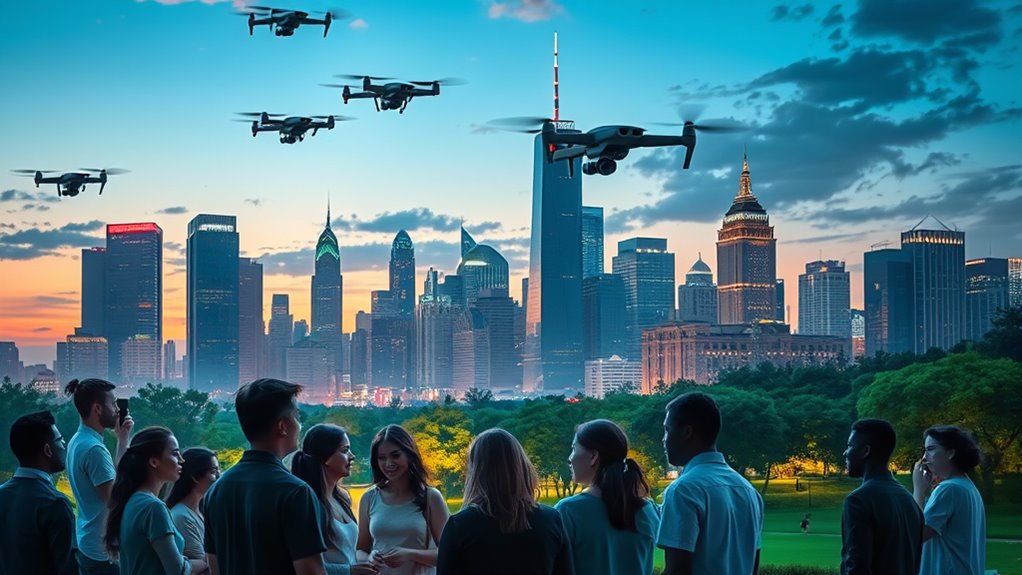
Balancing national security and privacy rights is becoming increasingly complex in an era where AI technologies can enhance surveillance capabilities.
New White House rules aim to ensure national security agencies use advanced AI responsibly while safeguarding civil rights. This includes prohibiting applications that violate constitutional rights or automate nuclear weapons deployment. Additionally, these rules emphasize the need for responsible AI use to align with American values. The integration of AI ethics is essential to guide these practices toward a more equitable society.
However, AI can expand surveillance, raising concerns about privacy, especially without transparency or oversight. The Office of the Director of National Intelligence stresses transparency as a core principle in AI ethics.
Legal actions by organizations like the ACLU highlight the urgency of uncovering how AI affects civil liberties. As AI evolves, maintaining a delicate balance between security and individual rights will remain a critical challenge.
Frequently Asked Questions
How Will AI Espionage Affect Individual Freedoms and Civil Liberties?
AI espionage can significantly impact your individual freedoms and civil liberties.
As surveillance capabilities grow, you might find your privacy increasingly compromised, with constant monitoring and data collection.
Biased algorithms could unjustly target marginalized communities, leading to discrimination and wrongful actions against you.
The lack of transparency in AI's decision-making processes may also erode your trust in institutions, raising ethical concerns about accountability in the face of heightened surveillance and potential abuses of power.
What Role Will Public Opinion Play in Shaping AI Espionage Policies?
Public opinion plays a crucial role in shaping AI espionage policies.
When you voice your concerns about privacy and security, you influence lawmakers to prioritize ethical considerations. Your awareness can push for stronger regulations and accountability mechanisms.
Engaging in public forums or discussions helps ensure that policies reflect your values. By advocating for transparency and education, you contribute to a balanced approach that respects both national security needs and individual rights.
Can AI Espionage Be Effectively Regulated on a Global Scale?
Did you know that over 60% of companies report AI being integral to their espionage strategies?
Regulating AI espionage globally is challenging but necessary. You'll face hurdles like differing national interests, data privacy issues, and rapidly evolving technologies.
While frameworks like the EU AI Act offer a starting point, achieving international cooperation and harmonization will take time.
Balancing innovation with security is crucial, but it requires ongoing dialogue and adaptation among nations.
How Might AI Espionage Influence International Relations by 2050?
AI espionage's influence on international relations could be profound.
You'll notice heightened geopolitical tensions as nations use advanced AI for surveillance and data analysis. Mistrust will complicate diplomacy, making cooperation harder.
Economic competition may intensify, leading to trade wars driven by AI-driven corporate espionage. Without robust international regulations, the risk of conflict could rise, pushing countries to reconsider their strategies and alliances in this rapidly evolving landscape.
What Measures Can Individuals Take to Protect Their Privacy From AI Espionage?
In a world buzzing with digital whispers, you've got to be proactive to safeguard your privacy from AI espionage.
Start by using strong encryption for your communications and limit the data you share online.
Regularly audit your privacy settings and be wary of apps that ask for excessive information.
Remember to anonymize your data when possible, and always stay informed about the latest privacy regulations to protect yourself effectively.
Conclusion
As we stand on the brink of a future shaped by AI espionage, we must tread carefully through the tangled web of ethical dilemmas and privacy concerns. Like a double-edged sword, AI can enhance national security while threatening individual freedoms. By 2050, the choices we make today will carve out either a utopia of safety or a dystopia of surveillance. It's up to you and me to ensure that we strike the right balance between security and our fundamental rights.









